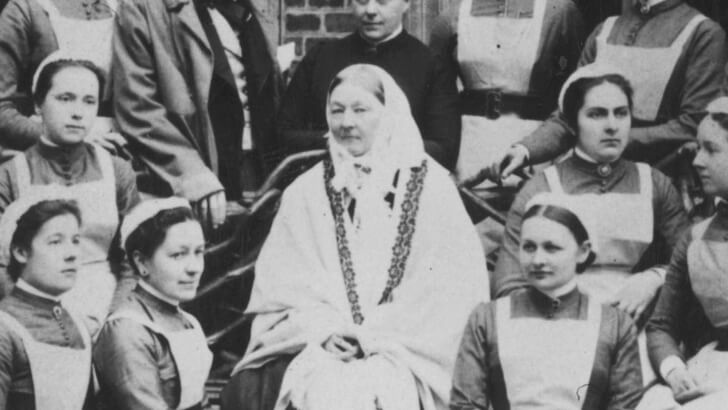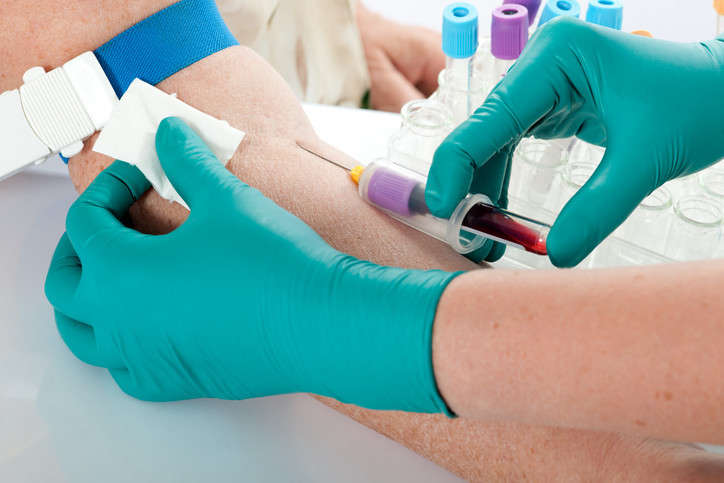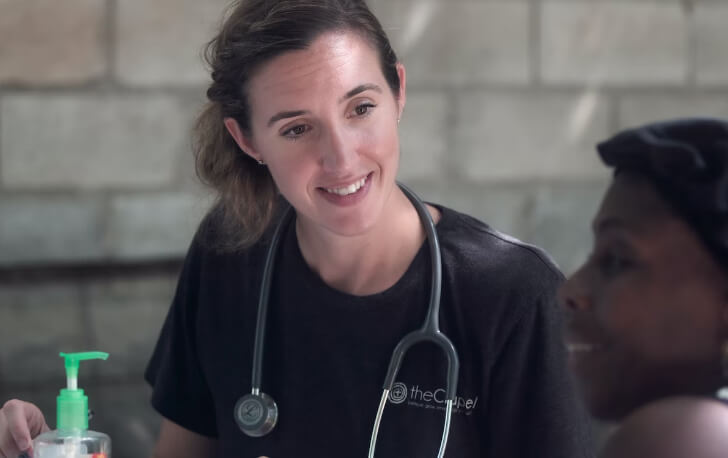Fear of Syringes

Did you know that when hypodermic syringes were first invented, the idea was to treat pain in a particular area of the body? Doctor Alexander Wood first employed it in 1853 to administer painkillers to a patient who had nerve damage in the area that was hurting.
It has since developed into an essential piece of medical technology. Despite the fact that there are several kinds of syringes, many people are terrified of them regardless of the kind or the location of the injection. If you fall into that category, our top-secret advice is to always distract yourself and take deep breaths before being pricked. You're welcome!
A Comfortable Space

The days of waiting 45 minutes in a sparsely upholstered chair in the waiting area before seeing a doctor are long gone for many. Simply because many people find it a hassle to go to the doctor. Instead of seeking medical attention and enduring such a wait, they prefer to stay home and take care of themselves instead.
Though there are still many such health centers today, things have largely changed. Rosalyn Cama, author of "Evidence-Based Healthcare Design," asserts that providing patients with a range of seating alternatives in the waiting room and the doctor's office helps improve their sense of comfort.
Greying Workforce

People providing services in healthcare facilities make up the workforce in the health system, from registered nurses to administrative assistants. There cannot be a health industry without a workforce, and the rule of supply and demand holds true in this area as it does in all others.
According to the U.S. Census Bureau, 20% of the country's workforce—or close to 20 million workers—will be 65 years of age or older by 2050. The healthcare system is not excluded. Given the law of supply and demand, there will always be a need for healthcare professionals, even though many registered nurses are already considered to be over 50.
One Healthy System, Several Branches

One of the most popular professional paths is medicine, which offers candidates a wide range of fields and super-specialties. With the emergence of new areas, technological advancements and creative ideas have advanced medicine. Although there are about 28 major branches of medicine, most doctors receive additional training in one or more of these fields. There are hundreds of different medical fields.
While many people are informed about well-known medical specialties like pediatrics, gynecology, and ophthalmology, others, such as dermatology, are occasionally overlooked. It is one of the oldest medical specialties, and the renowned Hôpital Saint-Louis in Paris established the first big school of dermatology in 1708.
Fun Fact About Dentistry

In the United States, there are about 201,000 dentists in practice. For every 1,600 people, there is one dentist. Though dentistry has been around for a very long time—as we all know—how many fascinating facts about dentists do you know?
Here's one for you: a dentist was first known to exist in 3000 BC. The first person to specialize in teeth was an ancient Egyptian named Hesi-Re. Although not much is known about him, we do know that ancient Egyptians took good care of their teeth. The historical Egyptians were far ahead of their time in regard to medicine, even though they weren't quite as advanced as we are now.
The Evolution of Medicine

What year did the practice of medicine start? The first doctors, who were they? Despite the lack of clear-cut answers to these questions, there is proof from prehistoric societies that 'treatments' were made for common ailments, albeit superstitions and religious beliefs were frequently mixed in.
We do know that there have been "doctors" from the time of the ancient Egyptians, and in this regard, the physician Imhotep wrote a book that details more than 200 distinct diseases. Do you know that theologians and anyone who could "teach" were often referred to as "doctors" back then? It wasn't until the 14th century in Britain that the name itself emerged.
Not a Walk in the Park

In addition to being among the professions with the greatest wages, doctors and other medical professionals have a reputation for being among the most dedicated and disciplined workers worldwide. A lengthy education—up to 11 years in certain cases—is required to become a doctor.
Prior to becoming a doctor, one must first complete a four-year stint in tertiary school. Typically, this is followed by three to eight years of post-graduate training, depending on the selected specialty, after four years of medical school. In the United States, all those years in school could result in student debt that is far higher than the norm. Please appreciate your doctor a little bit more.
Don’t Believe What You Hear!

Several medical myths still circulate today despite having been disproven by medical professionals. For instance, it has been claimed that the recommendation to drink eight glasses of water daily was taken out of context.
Yes, it is true that individuals should drink about 5 pints of water each day, but many people forget the second section, which states that prepared foods typically include the majority of this amount. Existing research indicates that regular daily intake of milk, juice, and even caffeinated beverages usually results in appropriate fluid intake. If you didn't know, drinking too much water can be harmful and lead to hyponatremia, water intoxication, and even death.
The Other Doctors

The first doctors weren't ones who people back then go to for medical concerns. In the early centuries, people called their teachers 'doctors.' Although the term is now frequently used in connection with the area of medicine, many non-medical professionals also hold the title after earning a doctorate in a subject that interests them.
In addition to earning a doctorate following a protracted and diligent educational path, people may receive an honorary doctorate as a way to honor them, as the name implies. People who have made significant contributions to their respective professions, such as Oprah Winfrey and Ye, are instances of people who earned a Ph.D. without taking any form of formal education.
The "Never Events"

Many have heard stories about surgeons who forgot something about their patients. For a profession that prides itself on precision, doctors have been known to accidentally lose surgical gloves, sponges, and equipment after a procedure. When employed, sponges, in particular, blend in with the patient's tissues and organs, making them difficult to locate.
These incidents are referred to as "never events," a class of surgical blunders that also includes operating on the incorrect patient or site. There are now procedures in place to track every item utilized throughout a process. Using special sponges or towels with unique barcodes, several hospitals have shifted to computerized counting.
Other Nursing Options

Many people are unaware that, like doctors, nurses can specialize in specific fields. There is a wide range of nurses that you might encounter because the nursing profession is continuously changing. The need for nurses is constantly increasing, and a career in nursing offers many worthwhile advantages, like good pay, lots of opportunities, and a sense of purpose.
For almost every interest, there is a type of nurse. In addition to the most well-known nursing specialties, such as registered nursing, nurse midwifery, and geriatric nursing, there are numerous others, including cardiac nursing, critical care nursing, family nurse practitioner, perioperative nursing, nursing administration, and so on.
Nursing in Time Past

The field of nursing is age-old. However, it is not as old as medicine. Nursing was not even considered as a vocation in the 18th century, much less a respectable one. Any woman who worked as a nurse was frequently from a working-class background, was ill-trained, and was not disciplined.
When nursing first began, women with education were frequently appointed as deacons by the church. The sick members of their community would receive treatment from these women. Religion and health care have historically been intertwined. The first hospitals were built during the Middle Ages by monks, nuns, and other religious communities.
Let's Talk About Florence Nightingale

Florence Nightingale is renowned for having helped establish nursing as a profession and for being a nursing pioneer. Despite coming from an affluent family, she refused to lead the leisurely life that Victorian upper-class ladies were expected to lead. Instead, Nightingale dedicated herself to caring for the sick, even though, at the time, people of her class status did not view this as a legitimate line of work.
By introducing the ideas of hand cleanliness, fresh air for patients, cleaning instruments between the sick, and other sanitary techniques during the Crimean War in 1854, Nightingale significantly influenced the healthcare sector and helped save the lives of numerous soldiers.
Healing in Medieval Times

Thanks to advancements in science, technology, and intellectual knowledge, medicine has come a long way. In the Middle Ages, many people hardly ever visited a doctor. They received treatment from the neighborhood herbalist, priest, or barber, who also extracted teeth, set fractured bones, and performed other procedures.
They used a combination of superstition, religion, and herbal treatments, some of which are still in use today, to treat their patients. They also used fire, drumming, chanting, mindfulness, and even psychedelic drugs in their rituals. The use of music and rhythm in healing back then is another fascinating aspect. Such interesting times!
Doctors Among Nurses

The nursing profession is unique! Nurses can complete a wide range of other honorable and morally upright professions, including engineers, pharmacists, physicians, police officers, psychiatrists, and even the clergy. Becoming a registered nurse is no easy task, just like becoming a medical doctor.
In order to practice nursing in the United States, you must finish a bachelor's degree, an equivalent qualification, or a certificate of completion from a nursing program. In case you didn't know, nurses can also be doctors. That's correct! Nurses can earn a Doctor of Philosophy in Nursing, a research-focused doctorate, or the highest nursing attainment, the Doctor of Nursing Practice.
The Perils of Medication Adverts

Medicines are promoted, much like any other product in the world. On television, they make various promises, including an immediate end of anxiety and relief from nerve discomfort. Even while it may not appear to be a problem, viewing these adverts might make many people feel as though they are not taking the appropriate or enough medication.
They consequently take more medication than is necessary as a result. According to doctors, purchasing medicine based solely on advertisements is risky because it equates to self-medication and excludes the involvement of a qualified medical professional. Additionally, it puts patients at risk for drug abuse due to overuse and reliance.
A Leaf from Chinese Medicine

Traditional Chinese medicine, which has been practiced for at least 23 centuries, tries to treat or prevent disease by re-establishing the balance of the yin and yang. Many of the treatments from Chinese medicine that Western medicine has accepted include chaulmoogra oil and iron for leprosy and anemia. Even before conventional medicine, Chinese medicine employed smallpox vaccination.
In the past, numerous surgical procedures were performed in Asian nations like India much differently, and herbs and mineral remedies were frequently people's first choices in times of emergency. These natural cures have undoubtedly been helpful to people who used them before, even though they receive less attention today due to improved medicine.
The Masters

Although doctors are among the nation's highest-paid workers, many look for part-time jobs in other professions. According to a 2018 poll of approximately 700,000 clinicians, close to 10% of doctors reported working 30 hours or fewer per week.
Some doctors look for possibilities in part-time occupations that allow them to advance their knowledge in ways that their current professions do not; many even do this to pay off the enormous student loans they accrued throughout their studies. Some desire to achieve a better work-life balance. By choosing part-time work, doctors can also enjoy greater freedom and autonomy, opening up new career fulfillment prospects.
Surgeons and Videogames

For surgeons, all those years spent playing PlayStation and Nintendo on the sofa seem to have paid off. Researchers discovered that doctors who played video games for a minimum of three hours per week conducted laparoscopic surgery around 27% quicker and with about 37% fewer errors than their non-gaming colleagues.
Thirty-three doctors were tested for the study, which was conducted in 2003 at Beth Israel in the United States. Video games can enhance eye-hand coordination, fine motor abilities, visual attention, computer competency, and depth perception, according to a prior study. As a result, educational video games could be helpful in training surgeons.
Technological Twist!

Since the creation of eyeglasses and stethoscopes, medical technology has advanced significantly throughout the decades. A growing middle class, an aging global population, and the spread of mobile internet are all propelling change in the healthcare sector. The corresponding technology is now evolving more quickly than ever.
Many cutting-edge medical innovations were put to the test on a large scale due to the 2020–2021 pandemic, which pushed healthcare into the future. Digital therapeutics for diabetes type I and type II, ADHD, cancer, asthma, insomnia, and migraines are among the innovations. Other innovations include advanced telemedicine, nanomedicine, and digital healthcare assistants.
The Sloppy Handwriting
Have you ever struggled to understand a prescription from a doctor and wondered why their writing is so sloppy? It can occasionally be a huge challenge for patients, pharmacists, and even other doctors to understand some physicians' prescriptions.
The question is, though, whether it's a deliberate action aimed to deter patients from self-medicating, if it's carried out under the strain of their jobs or whether it's a talent that only they possess. Writing quickly is one factor contributing to doctors' poor handwriting, which mostly started in medical school. These days, many are trying to change this, as it's been said to have been responsible for many deaths.
Agencies Helping Recruitments

Despite the growing need for medical professionals, it might be difficult for some hospitals to find suitable staff and the right hands to ensure premium care. Even though many nurses work in hospitals and other settings, many healthcare facilities still struggle with a lack of staff. Fortunately, there have been added approaches to getting the necessary medical personnel without adding to the workload of the existing team.
Medical staffing services are the best instruments for easing the stress of the hiring process without compromising the caliber of candidates. The establishment of the traveling nurse position was made possible by certain agencies.
Shakespeare and Nurses

You might find it interesting to know that when the term "nurse" was initially created, it had a completely different meaning. It appears to have originated from Latin words that meant "wet nurse" and "nourish," although it wasn't widely used until the 14th century when it was first used to refer to someone who looked after or breastfed children.
It wasn't until the 16th century that the phrase was employed to describe someone who looked after a sick patient. It's interesting to note that Shakespeare's "Comedy of Errors" contains the earliest known use of nurse in a specific medical meaning. Who could have imagined?
Working in Shifts Can Be Tricky

You seem to be a fantastic fit for nursing. You can make an impact as a nurse if you enjoy caring for others, work well under pressure, and aren't afraid of anything. There is only one issue: You can't cope with that many 12-hour shifts.
There are undoubtedly difficulties with this schedule. The ridiculously huge coffee mugs and the drowsy eye bags have been observed. On the other hand, we've also heard about how wonderful it can be—how much time may be spent on vacation volunteering, traveling, and seeing relatives. We believe nursing has its own ups and downs, just like any other career.
Medical Emergencies, Then and Now

Regardless of how little you are familiar with the history of healthcare, you are probably already aware that in the past, doctors would often prescribe treatments that were quite peculiar. They were dependent on bleeding for years, a treatment that was based on the antiquated notion that some maladies were brought on by an oversupply of blood.
When applied, leeches, which have been used for centuries, only withdrew a teaspoonful of blood, but doctors occasionally utilized more extreme methods. If they believed it was necessary, doctors could withdraw multiple pints at once by opening a vein, often in the arm.
The Icky Part

Even if you were fortunate enough to avoid severe bleeding, taking medication wasn't enjoyable. Highly hazardous mercury and arsenic compounds were frequently recommended medications, and the medical cabinet also contained naturally occurring toxins like deadly nightshade. Today, reading the first volume of the Pharmacopoeia, which was released in 1618, can be shocking since it provides a fascinating and in-depth look into what was once regarded as "medicinal."
Many of the "medicines" listed are not pleasant. Back then, substances like animal feces, sweat and saliva, blood and urine, and even powdered mummies were utilized to make medications. We really are grateful for the medical innovations today!
The Father of Medicine

Hippocrates was to medicine what Florence Nightingale was to nursing. Hippocrates was revered as a teacher and healer during his lifetime. He was born in ancient Greece in 460 BC, long before healthcare became sophisticated. Before him, doctors existed. But the majority of them would assume that disease results from paranormal sources. Hippocrates was the first person to cure diseases and ailments that had natural origins, though.
In actuality, he made a significant contribution to medicine. He is renowned for developing cutting-edge medical techniques and systems. In addition, Hippocrates established the "Hippocratic School of Medicine." It changed the field and made medicine a legitimate profession.
The Nurse-turned Influencer

Meet Lauren Drain, the most attractive nurse in the world, according to Instagram. She began her career in healthcare at 16 and worked as a registered nurse in the field of cardiology for about eight years. She spent years caring for patients in hospitals, but after a while, she felt overworked, overweight, stressed, and incredibly unhappy.
She decided to take charge of her life and chose to start a paleo challenge. Since then, she has gained over four million followers on her personal Instagram account, with whom she regularly shares motivational photos of her stunning physique and workouts. She also occasionally posts sultry images of herself in various settings.
The Mother of All Nurses

Florence Nightingale gained expertise in various medical fields, including public health and hospital design. Still, her contributions to the growth of the profession of nursing will always be the most widely recognized ones.
Nightingale's founding of the first sophisticated, autonomous nursing school of its kind at St. Thomas' Hospital in London in 1860 signaled the beginning of a transformation in nursing that eventually culminated in the development of a new career for women. Over 200 volumes were written by "The Lady With The Lamp," as she was known, including "Notes on Nursing: What it is and What it is Not."
Future Prospects

Nurses are the foundation of the healthcare system. More than 3.1 million nurse practitioners and more than 688,100 certified nurse nurses worked in the public health system as of 2010. Like any industry, employment rates, wage rates, and the prognosis for a given work profession tend to change yearly in the job market.
But during the past few years, employment in the nursing sector has steadily increased, and the outlook for the sector is improving. Between 2020 and 2030, the Bureau of Labor Statistics predicts that the nursing shortage will increase at a slightly above-average pace of 9%, creating various nurse career opportunities.

